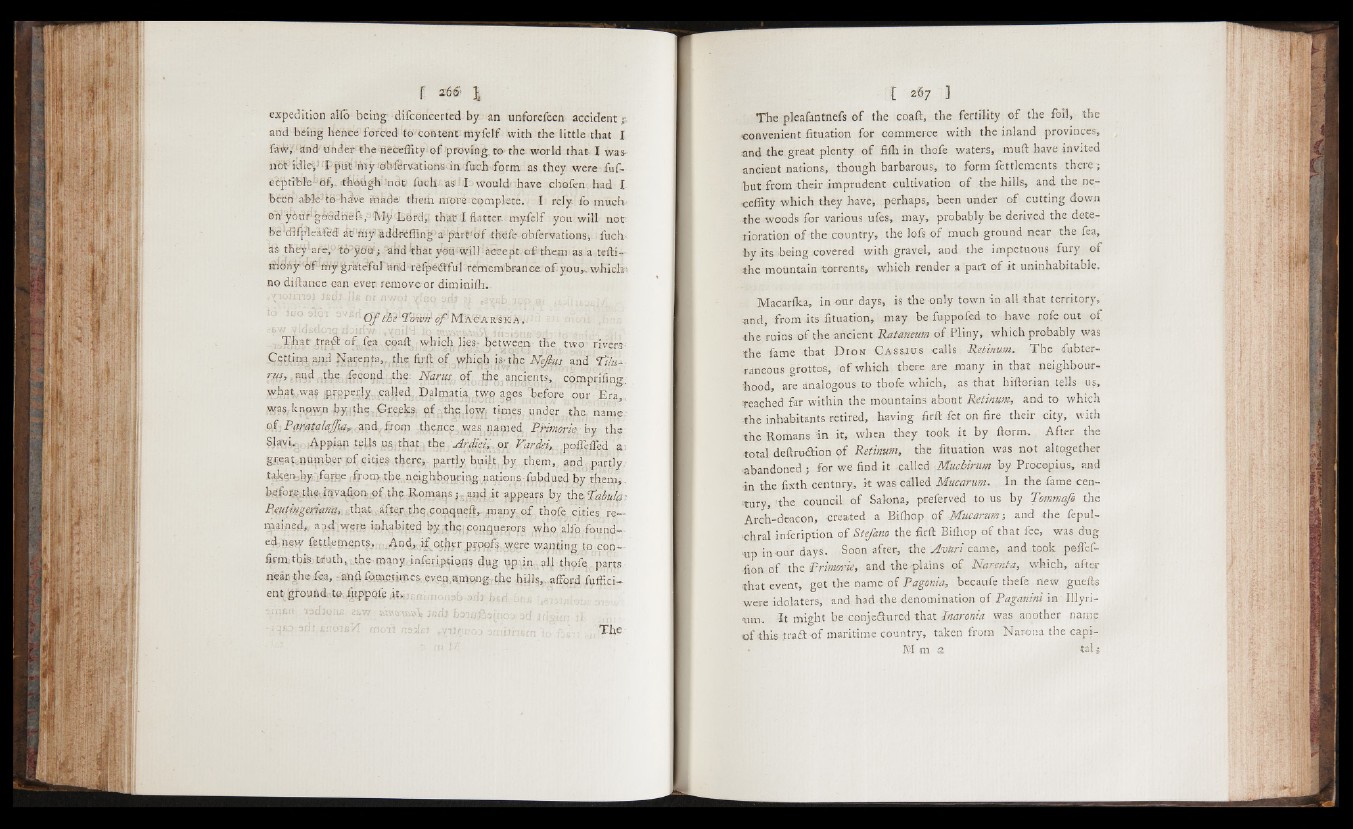
expedition alfo being difconcerted by an unforefeen accident jfc
and being hence forced'to'content m y fe lf with the little that I
few,' and under the neceflity o f proving to the world that I was-
nflt idlefc'd^putimy ieibiarvations in fuch form as they were- fu f -
eiptibfe- df,, «¿tighbncfe fuch asi I would have: chofen had I
been able’ to-'have made them more complete. I rely lb much
on yid f^ ^ idH e ’fe^W^'hiOrd',!, that I flatter, myfelf you will n o t
be tfffplellSflf ad'hiy^SddtWHnjjpaH^rt'o'f thefe obfervations-,. fuch-
a& tfife^Haffey^ to-yHif;. arid ^hat ysu-Will accept o f them as a te fti-
nfdnjPoEm'y grateful aifd'Te^edlfu] remembrance- o f you,, which»
no diftance oan ever removeor diminifh.
‘'a C f the fo'ttin- of Ma<$/vr:sk:'a..- :
T h a t fra^ of’.^a cpaft, which lies- between the two- rivers;
Ce^inj^a/rd Nj^eftfa,. the, -fir.fr o f which Nejkts and Tilii-
f$f*tfBS* nf t f er f f i h®; °f- the. ancients,' comprifing.
wh^tyW^' jppgpeply. p^ljed Dalrpatia two ages/before our Era,,
waS/kryjyvn o f ¿jthp.joyy,. tin^s.-undgr the, name.
QfPflmtqlaffliir. 3pd¥.from tljepc^. was^a^ied. BHmoria by the
Sjavi. .Apphfti tgfrs usjthat thp. ArAiej^, or Fardei, poilefied a-.
gr;eatuopniEer p f .citiga there,., partly built by. them, and partly
t^gnyfry/grge :fronhthg,A^hbpinin^ pauons^u.bdued by them,,
h$fo%thg'ilvatE°n;pf the Ropaans |-5#p,cjit anpgars by the, Tabulai
P,iuti%gejiflm> that. „after thq^onqaefr,, ,mapy£o f thofe cities" re—
raaingcfr ajd'.vyqre infra^ited by .thgipiji^uf^ors who idfo founded
n§!y feJtljOmpntSj;.. ^nd, i^c^Jjfr pyppf^., vygre wanting toreon--
firmjthitetdothy;the!many jnifeifipti^^ j-gg upun^yll thpfe. p^rts
near |hg .,fe, b j j * faw^jitpe^even.athOii^Ttlie hills,, afford fuffici-
ent'^iouildKtei^tipp^lc ibiirnifnonob orb bed
The
T h e pleafantnefs o f the coait, the fertility o f the foil, the
convenient fituation for commerce with the inland provinces,
and the great plenty o f filh in thofe waters, mull have invited
ancient nations, though barbarous, to form fettlements th e re ;
but from their imprudent cultivation o f the hills, and the ne-
ceffity which they have, perhaps, been under o f cutting down
■the woods for various ufes, may, probably be derived the deterioration
o f the country, the lofs o f much ground near the fea,
by its being covered with gravel, and the impetuous fury o f
the mountain torrents, which render a part o f it uninhabitable.
Macarfka, in -our days, is the -only town in all tha t territory,
and, from it s fituation, may be fuppofed to have rofe out o f
th e ruins o f the ancient Rataneum o f Pliny, which probably was
the fame that D io n C a s s i u s calls Jletinum. T h e Subterraneous
grottos, o f w hich there are many in that neighbourhood,
are analogous to thofe which, as tha t hiftorian tells us,
reached far within the mountains about Retinum, and to which
-the inhabitants retired, having firfl: Pet on fire their city, with
the Romans -in it, when they took it by Hon n. A fte r the
total deftrudtion o f Retinum, the fituation was not altogether
•abandoned; for we find it called Mucbirum by Procopius, and
-in the fixth centnry, it was called Mucarum. In the feme centu
ry , the council o f Salona, preferved to us by Tommafi the
Arch-deacon, -created a Bithop o f Mucarum-, and the fepul-
schral infcription o f Stefano the firfl; Bilhop o f that fee, was dug
u p in cu r days.. Soon after, the Av&ri came, and took poflef-
fion o f thePrimorie, and the-plains o f Namnta, which, after
that event, got the name o f Pagenia, becaufe thefe new guefts
were idolaters, and had the denomination o f Paganini in Illyri-
<um. It might be conje&ured that Inaronia was another name
c f this i r a & o f maritime country, taken from Narona the capi-
M m 2 ta lj